-
THE RIDER (Chloé Zhao 2017)
CHLOÉ ZHAO: THE RIDER (2017)
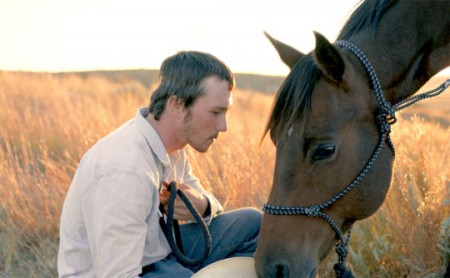
BRADY JANDREAU IN THE RIDER
A young cowboy
The Rider, a sad and beautiful little film using real people and dramatizing their lives, shows us the vanishing life of cowboys, especially the bronco buster, rodeo rider kind. The focus is Brady Blackburn (Brady Jandreau), a young cowboy who's had a severe head injury in a rodeo and has to come to terms with how it alters his life. He doesn't want it to, and we see why. Young Chinese-American filmmaker and NYU Film School grad Chloe Zhao and cinematographer Joshua James Richards show as few films can the beauty of the western lands of America, the clear skies, the glowing horizons, the grace of horses, their spirit, and the gentle, patient bond between them and the men who train and ride them.
It's painful and also deeply touching to watch Brady try to do what it's now dangerous for him to do. He was in a coma; he has a metal plate in his head. He has had seizures. There is a syndrome that makes his hands clutch up tight unable to open. He was a champion rodeo rider. If he goes out and does that again, it could be fatal. Even breaking horses is probably too violent, too physical. Yet he tries the latter. See how Zhao shoots Brady taming and eventually mounting a horse that's never been ridden before. This sequence says more about the bond between men and horses than any Western and captures a magical patience and harmony.
The Rider risks becoming becalmed as Brady sits with his differently enabled sister Lily and becomes almost too much to bear when he's playing with severely handicapped young rodeo rider Lane Scott at a rehabilitation center, paralyzed and rendered speechless. In a sense this film isn't exactly going anywhere. It swings back and forth; it's about a situation; about a process, not an event. There are no narrative subtleties or clever twists. The best moments, and they make it all worthwhile, are when Brady hangs out with best buddies Cat, Terry, Tanner and James, or with his father, Wayne Blackburn (Tim Jandreau), who drinks and plays the slots too much and neglects payments on their trailer and chides Brady for his stubbornness. This is where Zhao makes best use of the extraordinary access she has gained with these special people. They live in a world apart, not specifically mentioned, but of the Lakota Sioux in South Dakota's Pine Ridge Indian Reservation (and Brady Lower Brule Sioux heritage) - hence the quiet, the wild, isolated beauty of the land.
Maybe, as some might argue, the details of this world could be better delineated in a straight documentary. But not the emotion. And as Brady Jandreau said in a Q&A, the old Westerns showed cowboys who had no emotions at all. These guys have a lot of emotion, especially Brady. The Rider isn't so much about his way with horses, the adrenalin rush and fulfilment or rodeo riding, but about the emotions he's dealing with, which, under the stoicism and style - and these young cowboys sure are stylish - are painful and intense. Style, and a gentle disposition, are almost all Brady has left without access to the eight minutes of rodeo fame any more. He has virtually no education and no other skill set. But as Guy Lodge notes in his Cannes Variety review, Brady has what it takes to play himself and make it elegantly, touchingly watchable because he's equal to the film's emotional demands and is a "natural, laconic brooder, with the steady stance and gaze of a scragglier Heath Ledger." There's emotion, but the whole game is to steer clear of sentimentality.
Bravado and risk - the bronco-training, a hard wrestle with a pal, promises to the disabled Lane - alternate with hard knocks. Brady has to work in a local supermarket doing this and that, a humiliating scene for a cowboy. His favorite horse must be sold. Brady keeps telling everybody his time off from rodeos is only temporary till he Heals, but the film trajectory is of his gradual unspoken admission that the macho toughing-it-out, the "Say I won’t, and I will" tattoo on Lane Scott's back, must be relinquished. But this is a surrender that's never signed, except to acknowledge, in a final scene, that love and family outrank ego.
The Rider, 104 mins., debuted at Cannes Directors Fortnight, winning the Art Cinema Award; ten other international festivals including Telluride, Toronto, London and New York, screened at the latter 12 Oct. 2017 at Alice Tully Hall, Lincoln Center, for this review, followed by a Q&A with Chloe Zhao, Brady Jandreau and Tim Jandreau moderated by Kent Jones, Director of the Festival. The film will be distributed by Sony Pictures Classics in 2018. Metascore 84%.
Last edited by Chris Knipp; 10-13-2017 at 08:23 AM.
-
ISMAEL'S GHOSTS (Arnaud Desplechin 2017)
ARNAUD DESPLECHIN: ISMAEL'S GHOSTS/LES FANTÔMES D'ISMAËL (2017)
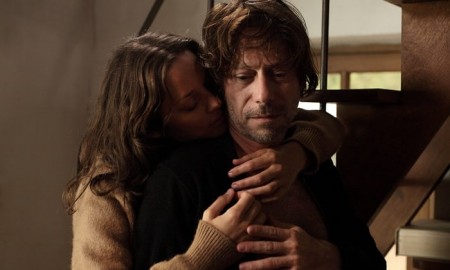
MARION COTILLARD AND MATHIEU AMALRIC IN ISMAËL'S GHOSTS
Like Daedalus, Desplechin shoots high and crashes
This new film by Desplechin has some similar elements, going back and forth in time, exotic locations, Russians, with his last one, My Golden Days. But while that one was charming and came together, this one is annoying and makes no sense. It seems the English-language critics agree with me, because the Metascore is a miserable 58%. The French public also seems to have hated it (AlloCiné 2.2, terrible), but the French critics, on the other hand, were pleased (4.0). There is a great deal of sound and fury here - and shouting by the lead actor, Mathieu Amalric, who's at his shrill, excessive worst (and other cast members don't look their best either). But all the complexity seems more imaginary than real.
Nothing comes together, and nothing resonates either emotionally or aesthetically. This is a curiously drab looking film, a jumble of scenes and incidents, full of sound and fury, signifying not as much as they seem to want us to think. Those who admire it all are seduced by the air of complexity and stick with it. The rest of us go away disappointed. At his best, which is a lot of the time, this original and passionate director produces films that are rich and lovely and significant, like Kings and Queen, A Christmas Tale or My Golden Days. But he's capable of duds, as is shown by Jimmy P, and this is one of them. No doubt a necessary stepping stone, as Robert Motherwell said about his unsuccessful artwork, to the films that sing and charm us.
The movie actually doesn't begin the way the trailer makes you think, and I admit I saw the trailer several times a while ago: in it, the protagonist, Ismaël, played by Matthieu Amalric (Desplechin's longtime alter ego), a filmmaker (though we don't see him making any films, and only rarely writing) is living with a new woman, Sylvia, played by Charlotte Gainsbourg, when suddenly on the beach there appears to her a woman, Carlotta Bloom, played by Marion Cotillard, who declares herself to be the wife who disappeared 22 years ago, a shock that disturbs and infuriates them. She has been alive, and didn't tell them. Well, that's a somewhat contrived subject, perhaps worthy of someone like Hitchcock. But actually Desplechin has a whole lot else going on and it's not clear what part this shocker plays or where the center lies. The trailer is more conventional, and Hitchcockian, and it provides a structure that you could make an interesting film about - that revelation of the reappearing wife missing for 22 years. Claude Chabrol might have made a murder mystery out of it.
The film actually begins somewhere else, with scenes from a movie about a character called Ivan Daedalus (Desplechin seems to have been reading James Joyce - but he's also referring back obliquely to his first film), played by Louis Garrel, based on Ismaël's supposedly ne-er-do-well brother, a minor diplomat, whom he thinks was a spy. And these scenes of Daedalus recur. But what the point of them is, isn't so clear. Nor is the crisis of Carlotta-Sylvia resolved in a satisfying way. Though definite things happen, it's blurred by some shifts back several years that seem confusing.
The action here gets lost in useless drama, Ismaël looking like a bum and having fits of hysteria, everybody slurping from glasses of wine or whisky. The biggest disappointment is that things aren't resolved, either in Ismaël's artistic life or his personal one. But the characters also just don't engage us the way they do in My Golden Days or A Christmas Tale. Much use is made of swirling music, which reminds one of Gabriele Mucino's films, where the main characters are all having an adolescent, or thirty-something, or mid-life crisis, all at once. Mucino's films may be conventional, but they make sense and their issues are resolved. The swirling leads somewhere.
Carlota explains what she was doing in her years in the void, but her revelations are a huge letdown. There's still no motivation, and not much detail. She's not really interesting. But then, of course, perhaps she's Ismaël's fantasy, his "ghost" (fantôme in French). Yet she can't be, because Sylvia is the one who sees her first.
It's not satisfying to watch a film where the plot is a mystery, or the key elements are dropped for other ones along the way for no clear reason. Desplechin is original and gives his imagination free reign, but that allows for self-indulgence, which this time was fatal.
At first I was intrigued. But as time went on, my attention was not rewarded. The Guardian's film critic, Peter Bradshaw, has a knack for putting things in sharp, clear terms, and his conclusion about Ismaël's Ghosts at Cannes stands up today. He wrote: "This is an unfinished doodle of a film, a madly self-indulgent jeu d’esprit without substance: a sketch, or jumble of sketches, a ragbag of half-cooked ideas for other movie projects, I suspect, that the director has attempted to salvage and jam together." The version reviewed here was presented five months later as the 20 minutes longer "director's cut." It would require more than the addition of additional footage to bring Ismaël's Dreams into a form that made sense and had true artistic merit.
Ismaël's Ghosts/Les fantômes d'Ismaël,[/I] 134 mins., debuted at Cannes in Competition 17 May 2017 and simultaneously in French cinemas; ten or so other international festivals, including the New York Film Festival, where it was screened for this review (as the "director's cut") at Alice Tully Hall, Lincoln Center, 14 Oct. 2017.
Last edited by Chris Knipp; 10-15-2017 at 06:19 PM.
-
FÉLICITÉ (Alain Gomis 2017)
ALAIN GOMIS: FÉLICITÉ (2017)

VÉRO TSHANDA BEYA MPUTU IN FÉLICITÉ
Rough music
Events take place in Kinshasha, the big city and capital of the Congo, one of the poorest countries in Africa. and focus on the hard-knock existence of the title character, a singer in a bar (Véro Tshanda Beya Mputu). Her fourteen-year-old son gets in a motorcycle accident and is badly hurt (and he gets worse). When she asks for money from her husband for her son's operation, he chases her out; her father threatens to kill her, but gives her the money. The actress has a raw, down-to-earth intensity that fits the character's hardscrabble existence. As it must.
The severe injury of Félicité's son is a bad blow for her, and the actress said that the character was half alive and half dead. But the vigor of the music is invigorating. Moreover Kinshasha is a rare African town that has a symphony orchestra and when we see and hear it playing Fratres” by Arvo Pärt, it raises us to a higher livel. The filmmaker, Alain Gomis, a Senegalese born in Paris, whose his previous features were Aujourd'hui (2012) and L'afrance (2001), folds the music in sparingly but effectively with the scenes, weaving a sense of the vernacular cheek by jowel with the sublime. Gomis has a real feel for cinema. Somehow wordlessly, more with Beya's worldly wise, knowing, ironic and sensuous face than anything else, conveys a sense that under the right conditions hardships and compromises can absorbed and made to play in one's favor, if one has what it takes. And you never doubt that she's got it. However, one must confirm as various critics, such as Jordan Melzer of Hollywood Reporter, have, that "The storytelling is a bit wobbly, and, especially in the latter scenes, drawn-out almost to the point of exhaustion," but also as he says, that this is compensated for by "moments of poetry" scattered through the film, particularly in the form of music.
a
Félicité, 129 mins., debuted at the Berlinale winning the Silver Bear and nominated for the Golden Bear. other awards including Chicago, Istanbul, Jerusalem, Sydney and Mill Valley. Included in the Main Slate of the New York Film FEstival. Reduced 29 Mar. 2017 in France, very well reviewed (AlloCiné press rating 4.2). Acquired by Strand Releasing, it comes to The Quad Cinema on Friday Oct. 27, 2017. Metacritic rating 75%.
Last edited by Chris Knipp; 02-15-2024 at 02:48 PM.
-
BPM/120 BATTEMENTS PAR MINUTED (Robin Campillo 2017)
ROBIN CAMPILLO: BPM/120 BATTEMENTS PAR MINUTE (2017)
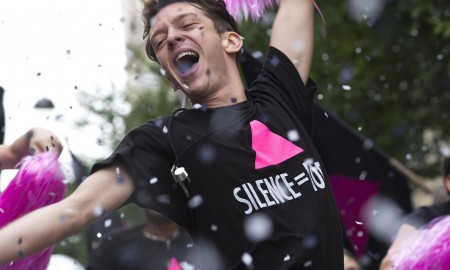
NAHUEL PÉREZ BISCAYART IN BPM
Love and AIDS activism in gay Paris
Love and AIDS activism in gay Paris
In his film, Robin Campillo depicts the life of French ACTU-UP in the early Nineties, fighting against government and Big Pharma indifference to gay AIDS suffering in France as the original New York ACT-UP had done to American straight mainstream non-cooparation starting in 1987. Campillo's stirring film is both universal and personal. It evokes many communities' struggles against an indifferent world, or youth against hostile elders. It's also a personal, individual homage to a time when Campillo himself was an activist, and it's a moving portrait of love heightened by closeness to tragedy.
As I watched BPM, I often thought of David France's documentary about ACT-UP in New York How to Survive a Plague ( ND/NF). I also remembered living in San Francisco in the early Eighties, when I'd open the two gay weekly newspapers every Monday and page through one photo after another of young men cut down in their prime by the terrible new disease. Campillo vividly evokes the heightened atmosphere of those times. Bdyond anything that happens here, I value the atmosphere it creates and the times and emotions it leaves one to muse upon.
As I wrote of France's film, "People were dying left and right, life was tragic, but people had a palpable sense of the need to go for broke, and the leaders were heroes who were the best they could be." BPM effectively captures this feeling with a vivid, well-chosen cast and a fluid, emotionally intense movement, slipping from one sequence into another to show how the same spirit inspired them all. At the center are Sean Dalmazo (Buenos Aires-born Nahuel Pérez Biscayart, The Aura]
, Glue) and Nathan (Arnaud Valois), two activists, from the original core of French ACT-UP who become lovers. The memorial for one of them at the end, bringing together all the original activists, serves as a ritual representing the innumerable losses.
BPM isn't about the horror of AIDS and doesn't emphasize gruesome symptoms but it does have a bit of realistic anal sex. However, it's primarily about activism. Its core is debate, conducted by rules to keep unnecessary talk minimal. The group applauds by finger-snapping to interrupt talk less: this finger-snapping approbation gives the gatherings their unique flavor - and also Campillo's habit of shifting seamlessly to another scene and another debate to move things forward. The film is staunchly improvisational, its speeches passionate and off-the-cuff, and the whole inspired by a team spirit that fits the action. Debate is the essence, but it's stripped down so as to find the most effective strategies.
Alternating with debate, and eventually love story, are the shock tactics, notably the throwing of fake blood at establishment objects. These passages make explosions of energy releasing what's pent up in the tedious arguments and laborious bureaucratic dealings, and the alternation gives the film a vigorous rhythm. But while it has energy and movement, BPM is deliberately "untidy," flaunting rough edges, though still full of articulate writing, with Campillo and Laurent Cantet collaborating here as they did for Cantet's The Class.
The title, the average heart rate, may evoke Larry Kramer's classic autobiographical play and New York HIV-AIDS account[i]The Normal Heart[/I, but Campillo's film is more understated than American accounts, and in particular isn't out to provide indoctrination or instruction, to feed us dates and names and lines of demarcation. This I found refreshing and also, moving. It allows us to enter more freely into the mood.
BPM/120 battements par minute, 140 mins., debuted at Cannes 20 May 2017, winning the Grand Prix, Queer Prize and FIPRESCI Prize, also showing in two dozen other international festivals, including the Main Slate of the New York Film Festival.
Last edited by Chris Knipp; 02-15-2024 at 02:46 PM.
-
LET THE SUN SHINE IN/UN BEAU SOLEIL INTÉRIEUR (Claire Denis 2017)
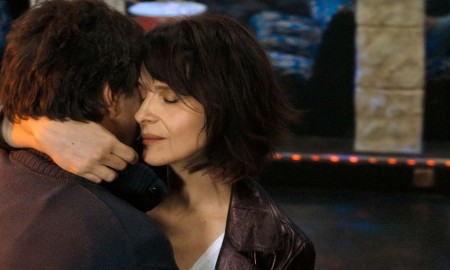
JULIETTE BINOCHE IN LE THE SUN SHINE IN/UN BEAU SOLEIL INTÉRIEUR
CLAIRE DENIS: LET THE SUN SHINE IN/UN BEAU SOLEIL INTÉRIEUR (2017)
Sad comedy of an older woman seeking love
Though she somewhat returns to the obsessive female love territory of her 2002 Friday Night, French master Claire Denis takes a different tack from more serious films like Beau Travail (1999), White Material (2009) and 35 Shots of Rum (2008) in this new film, whose lead is masterfully possessed by Juliette Binoche. Un beau soleil intérieur follows a 50-something woman - a very beautiful one, obviously - in her "search for love" with various men. It's a tragicomic series of misadventures, delineated by many sexy intimate closeups by regular dp Agnès Godard, but also by comically clumsy meandering dialogue that dramatizes the fumbling search and gently satirizes the comic war, or dance, of the sexes. And for this unusual, highly verbal, aspect of the film, Denis has collaborated with novelist and playwright Christine Angot, who has provided many of the devastatingly silly, or cruel, lines. And Isabelle (Binoche's character) is silliest of all, witness her long final session with a fortune teller (Gérard Depardieu). As many have noted, this is both Denis' most lighthearted film (despite its sad side) and her talkiest.
That ending says this: Isabelle has no idea how to choose a man, and she has not found an appropriate one. But she's still ripe for the game, and playing it requires doses of cockeyed optimism. Depardieu's seer hasn't a clue, and neither has Isabelle, and so the plotline isn't really quite leading anywhere, neither plumping for nor quite rejecting any of the unsuccessful mates - which is, after all, rather kind to men in general, offering some sympathy for even the worst of them. It begins with a stuckup banker, Vincent (the very smooth, subtly repulsive Xavier Beauvois), in the first, most realistic sex sequence, which ends with neither of them satisfied. Then she spends an evening with a married, self-absorbed young actor (Nicolas Duvauchelle, very cool and sexy), and she is tremendously excited by the idea of him. At her place, he is recalcitrant. He asks for a drink, then when offered it, wants to leave. Se coaxes him back, and he stays. Next morning he explicitly wishes it hadn't happened, insisting he preferred the "before." The rapport is ruined, if there ever was any, and yet the nature of the danger is that the attraction still hovers on both sides, nudged by the stuttering talk.
She goes to bed with her ex-husband - who tells her their ten-year-old daughter says that when she's with her, Isabelle cries every night, and that's bad for her - while Isabelle is turned off by something he does in sex that she finds false and artificial, so that encounter gets cut abruptly short, a pretext perhaps. Several other men follow, one a sympathetic artist colleague (Bruno Podalydès); another a beautiful, sad-faced stranger (Paul Blain) with whom she has a lovely dance to Etta James' song, "At Last." Is that the best it can ever be, an iconic torch song and a swoony dance with a stranger? Or does this only symbolize cinema's inability to capture love in anything but iconic images?
Binoche is wonderful through all this, sympathetic, needy yet never pathetic, occasionally looking almost her age perhaps, but frequently having moments of happiness, hope, or desire where she glows and radiates like the prettiest of twenty-somethings. She is something, and she never seems to be straining. It's all completely natural, possessed, from within, a career best performance and a triumph for the reputation and promise of that under-appreciated group, actresses of a certain age.
What these connections all have in common is that none of them is quite right, and that they often contain random droll moments of pretension, misapprehension or malapropism. LIfe is alarmingly frustrating and silly. And yet the point is, that in spite of that, the urge is still always there. Throughout, Denis asserts her style and mastery by the rhythm she gives the scenes and the way she transitions from one to the next; by the extraordinary subtle, flickering balance between the sad and the droll. She has faced danger and transformation in films like Beau Travail or The Intruder and here, she's not moving toward some rom-com plotline resolution. This is underlined in an original fashion by the ending session, over closing credits, with the kooky, meandering "seer," Depardieu fluently improvising, riffing, inventive nonsensical bullshit about Isabelle's men and her futures with them, all of whom he sees as positive - or perhaps not. Nothing is certain, and nothing is concluded. And that's bravely life-affirming.
Let the Sunshine In/Un beau soleil intérieur, 94 mins., debuted at Cannes 18 May 2017 in Directors Fortnight, opening in France 27 Sept., AlloCiné press rating only a good 3.5 (70%), but top marks from Cahiers, Les Inrocks, Libération and Humanité. in at least 26 international festivals including Toronto, New York and London. Watched 29 Oct. 2017 in Paris at Cinéma Le 3 Luxembourg.
Last edited by Chris Knipp; 10-12-2022 at 04:20 PM.
-
THE MEYEROWITZ STORIES (NEW AND SELECTED) (Noah Baumbach 2017)
NOAH BAUMBACH: THE MEYEROWITZ STORIES (NEW AND SELECTED) (2017)
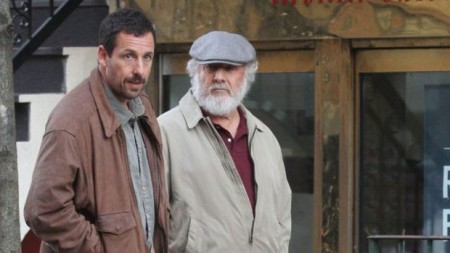
ADAM SANDLER AND JUSTIN HOFFMAN IN THE MEYEROWITZ STORIES (NEW AND SELECTED)
Baumbach's shot at maturity and warmheartedness
One reviewer, Jessica Kiang, says it evokes "so many other media," theater, short story, TV, she doesn't know why it's a film. She puts her finger on something. This is scattershot, fragmented, and it does that in a sincere and not unsuccessful effort to adopt a warm and comprehensive point of view. This is also perhaps the former Wes Anderson writer's most Wes Anderson film.
It is mainly a decent attempt to be not dry, witty, and cruel like The Squid and the Whale (still an entertaining and watchable film), but, only 12 years later, to be about being an adult, having children, learning to forgive one's father and face his mortality, and so on, and so forth. The "stories" faceting helps to do that, but leave one with a messy, shattered vision. Maybe this is a transition, and that would be from cleverness to something like wisdom, a harder mark to strike.
There are two brothers, the financially successful Matthew (Ben Stiller, very fast on the ball here), and Danny (an unusually straightforward Adam Sandler), once interested in being a musician, but never having done anything, really. Their father Harold (Dustin Hoffman, also straightforward and fine), who was married four times, is a sculptor, but whether he was any good is a question the sons must face. At any rate he taught for 33 years at Bard, where Danny's daughter, Eliza (Grace Van Patten) studies and is a "promising filmmaker." Or does she just partake of the pretension of the younger generation and its ease with provocation, since her little ilms are comic-pornographic? There is also Jean (the surprising Elizabeth Marvel), who was always ignored but does her duty of being present nonetheless and has one speech of protest.
A storyline that strikes home for some of us is the one about work, calling, and worth that finds Harold's career highpoint in a box in storage at the Whitney Museum because yes, the museum indeed once did buy one of his sculptures. And yet Harold, struggling with age and failing powers, deceives himself into thinking inclusion in a Bard faculty show is a "retrospective" or that a photo album of his sculptures will lead to one, and that will give his career a boost. This is about male ego and self-deception but also about sons coming to terms with the real size of their once enormous and threatening and detestable fathers. Is Harold really a very good artist who just didn't "play the game" like his contemporary L.J. (Judd Hirsch), who's having a show at MoMA, or is he just kidding himself? But he's obviously at times a pretentious twat, as when he says things like "I find Maugham to be skillful without being an artist. . ." His simplistic and pompous little dismissals of everybody show him to be an ass, but somehow they have no bite. This script is full of loving detail. It's satire is forgiving. So is its low keyed piano score - forgiving of the audience.
Being, wisely, about what people are rather than what they do, the film isn't heavily plot-driven, and that's a good thing, though it has solid plot elements, especially revolving around hospitals for Harold, who has a life-threatening crisis, and for Danny, who faces up to the need for a hip replacement. Matthew takes care of it, even to a private room, and this is one of numerous sequences about the brothers' rapprochement. Any rapprochement with Harold is fraught because however diminished, he remains as annoying as he ever was. In an exaggeratedly frank speech by Danny at the faculty show, which Harold can't attend because he's in the hospital, Danny says he hopes his father was a good artist because if he wasn't, "he was just a prick."
This strikes a false note, due to Sandler's unusually straightforward delivery here. This is a new Sandler, to go with the new, more humane and serious Baumbach. This is far from his wittiest film and as Kiang's comment hints, there are ordinary, sit-com-ish elements, but there are home truths about growing up that make the less sprightly texture seem worthwhile. This is all about the three main males as finely played by Hoffman, Sandler, and Stiller, but there are other good actors including Candice Bergen, Emma Thompson, Judd Hirsch, even a cameo by Sigourney Weaver that becomes one of several recurrent jokes that help keep the tone light.
This was at Cannes, then the NYFF Main Slate, but released on Netflix 13 Oct. Watched online, but in Paris. Also showing in US theaters, including IFC and Landmark. Metacritic rating 79%. There's a lot to cover here in a thumbnail review. It takes a while to get going, but when it does, it feels warm and kind, and you appreciate its sincerity and goodwill. And yes, Dustin Hoffman and Adam Sandler are good even if Ben Stiller is the closest to a grownup, among the males anyway. Watched 4 Nov.
Last edited by Chris Knipp; 11-05-2017 at 05:43 AM.
-
LADY BIRD (Greta Gerwig 2017)
GRETA GERWIG: LADY BIRD (2017)
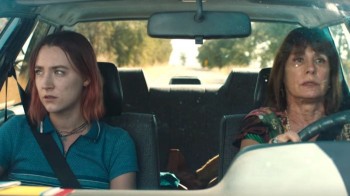
SAOIRSE RONAN AND LAURIE METCALF IN LADY BIRD
Loving and leaving Sacramento in a sparkling if overstuffed debut
Greta Gerwig has been an actress with the mumblecore directors Joe Swanberg and the Duplass brothers; and, with growing fame, with other directors like Jason Winer, Alison Bagnall, Woody Allen and Whit Stillman. Then with mutual profit and success she became a muse for Noah Baumbach, contributing a lot to the writing of the Baumbach films she starred in as she had to earlier screenplays (in fact she had focused on acting originally only because she couldn't get into playwriting MFA programs). Now at last after over a decade in the business, she has become a writer-director, creating but not acting in her own loosely autobiographical tale. It's a generally lighthearted feature that tries to say a little too much but is fun and amusing and not without its moments of heartache and shock. This movie is charming, but flawed. It won't assume a place among classics of the recent past like Heathers, Sixteen Candles, and The Virgin Suicides. But it seems a good expression of the ebullient spirit of its maker and it has some things to say about early millennial ambition in the urban boonies and some of the tests faced by a California girl in her late teens in 2002.
Lady Bird focuses on senior year at a Catholic high school in Gerwig's native Sacramento, California, that crucial moment in a bildungsroman before its protagonist escapes to the great world where she must go to make a name for herself. Though to start out she's not going off to be a star in any particular field of the arts, only choosing to go to study at an East Coast college and not a local California school like, most obviously, UC Davis, which for this young woman would be death. After all, it started life as an agricultural college. This girl really wants New York, and she knows it.
But she's not New York, and she's not shrewd or sophisticated. She a Sacramento girl. The problems Christine "Lady Bird" McPherson (Saoirse Ronan) encounters are several. In a school musical production she gets involved with Danny O'Neill (Lucas Hedges), and they have a sweet affair. He "respects" her and loves her so much he doesn't want to touch her breasts. At prom night another reason for his reticence emerges: he's actually gay. That ends that. Hedges is an actor much in demand who was Oscar-nominated for his supporting role in Manchester by the Sea; not surprisingly, he's touching and adorable in this role, which doesn't end with the couple's abrupt breakup but has several appealing followup scenes. Next, via a coffeeshop job, Lady Bird finds her way to the cool, sophisticated Kyle (Timothée Chalamet, another topnotch young actor, costarring in the upcoming Call Me by Your Name), who's also apparently rich. But there is a misunderstanding that makes her feel cheated when she thought they were both losing their virginity together, and it turns out Kyle has been with "about" six girls: he doesn't even keep count. This portrait of Lady Bird's amorous and sexual path is limited but vivid.
With girlfriends it's complicated too. Her best friend is the plump, smart Julie (Beanie Feldstein), who's good in math (as Lady Bird would like to be but definitely isn't) and in love with the handsome math teacher, Mr. Bruno (Jake McDorman). But our heroine is a snob, or a climber (also not averse to cheating on tests or stealing a grade book), and gets into an "in" set by pretending to be rich and pals around with stuck-up Alpha rich girl Jenna (Odeya Rush). A major asset of Danny's was that his grandmother lived in her favorite house in the poshest neighborhood of Sacramento. It's not a tough decision to choose Thanksgiving at Danny's grandma's over at her parents. In justification of this trend, Lady Bird's family is poor, and rising beyond it is going to take maneuvering. Her long-depressed father (Tracy Letts) loses his job in the tech industry, and finding another is tough. Her mother (Laurie Metcalf) works in a psychiatric hospital.
A major theme is Lady Bird's conflict with her mother, whose constant criticisms get in the way of her showing her underlying love. This movie is over-busy, and though it constantly touches on this theme, it never emerges with the force it seems to deserve. (On the other hand, it contains many choice moments one wouldn't want to see cut.) Daddy comes through smelling like a rose, kindly filling out the student loan applications that are crucial to Lady Bird's escape, and also when she does leave, slipping into her suitcase thrown away letters that show her mother's love. The latter is a compensatory afterthought, more telling than showing, but fits in with Gerwig's omnibus writing style.
As Christine "Lady Bird" McPherson, Saoirse Ronan delivers a fine and dedicated performance that yet has lightness. Ronan has a severe presence, and may seem a very odd choice as a stand-in for the beautiful and bubbly Gerwig, who is luminous where Ronan seems drab and flat. But Ronan is also simply very, very good. Even if the actress lacks Gerwig's beauty and bubbliness. some of the other major qualities are there, and Ronan exudes an energy here that eventually gives her too a kind of glow of her own. Nonetheless as Richard Brody says in his New Yorker essay, this film is tight and on the surface conventional and lacks the exhilerating improvisatory feel of many of the ones Gerwig has previously acted in and helped write.
The main thing is, this happens in Sacramento, to which this is a hail and farewell. Lady Bird, doubtless like the filmmaker, loves Sacramento. When Lady Bird finally gets her driver's license, driving around the town and admiring its sights moves her deeply . But this flat, hot town, original home of Joan Didion, who escaped to places like Malibu and Manhattan, is too limited for such an ambitious young person. For college she must go to New York, or, if not there to a college in Connecticut or New Hampshire, "where writers live in the woods."
This isn't much of a sketch of intellectual development. Lady Bird goes to a Catholic high school. One nun does speak of her love of Kierkegaard. And her second boyfriend has gloomy, left-leaning political ideas. Meanwhile it's post-9/11 and Bush's wars are getting going.
On the one hand, Gerwig tries to tell us too much information. Some elements never seem clear, like Lady Bird's brother (Jordan Rodrigues) and sister, apparently adopted? On the other hand, despite the lack of subordination and inclusion of undigested details, they do give the movie a particularity that others of the kind often lack. Gerwig is irrepressible. That is part of the charm. And in this lean season this movie is a boon and contains much that can be savored.
Lady Bird, 94 mins., debuted at Telluride (1 Sept. 2017) and Toronto (8 Sept.), also was at the New York Film Festival (8 Oct.) and in 14 other festivals. It opened in the US 3 Nov. 2017.
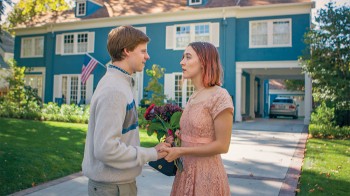
HEDGES, RONAN IN LADY BIRD: AT DANNY'S GRANDMA'S HOUSE
Last edited by Chris Knipp; 11-23-2017 at 06:24 PM.
 Posting Permissions
Posting Permissions
- You may not post new threads
- You may not post replies
- You may not post attachments
- You may not edit your posts
-
Forum Rules





 Reply With Quote
Reply With Quote







Bookmarks